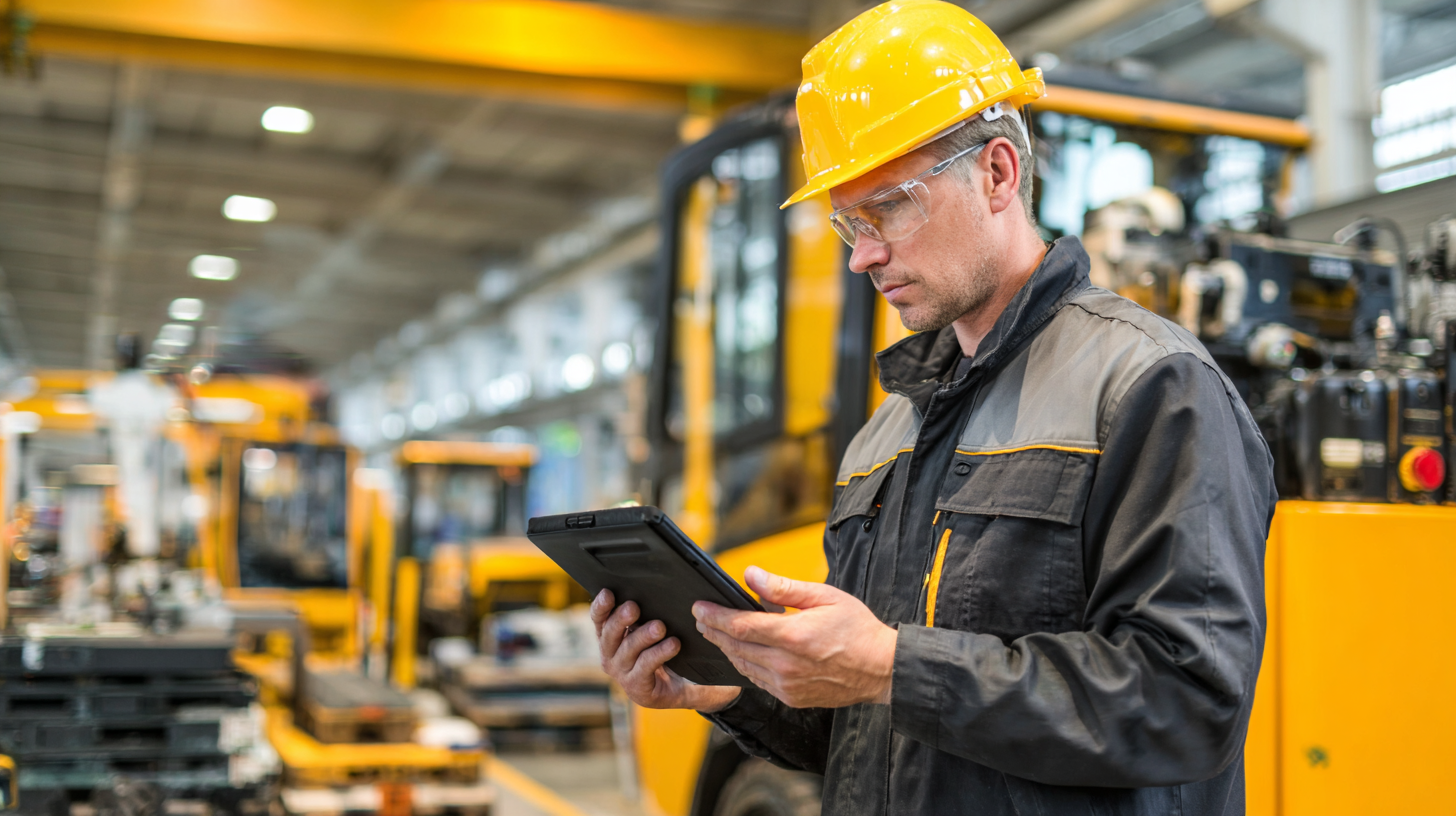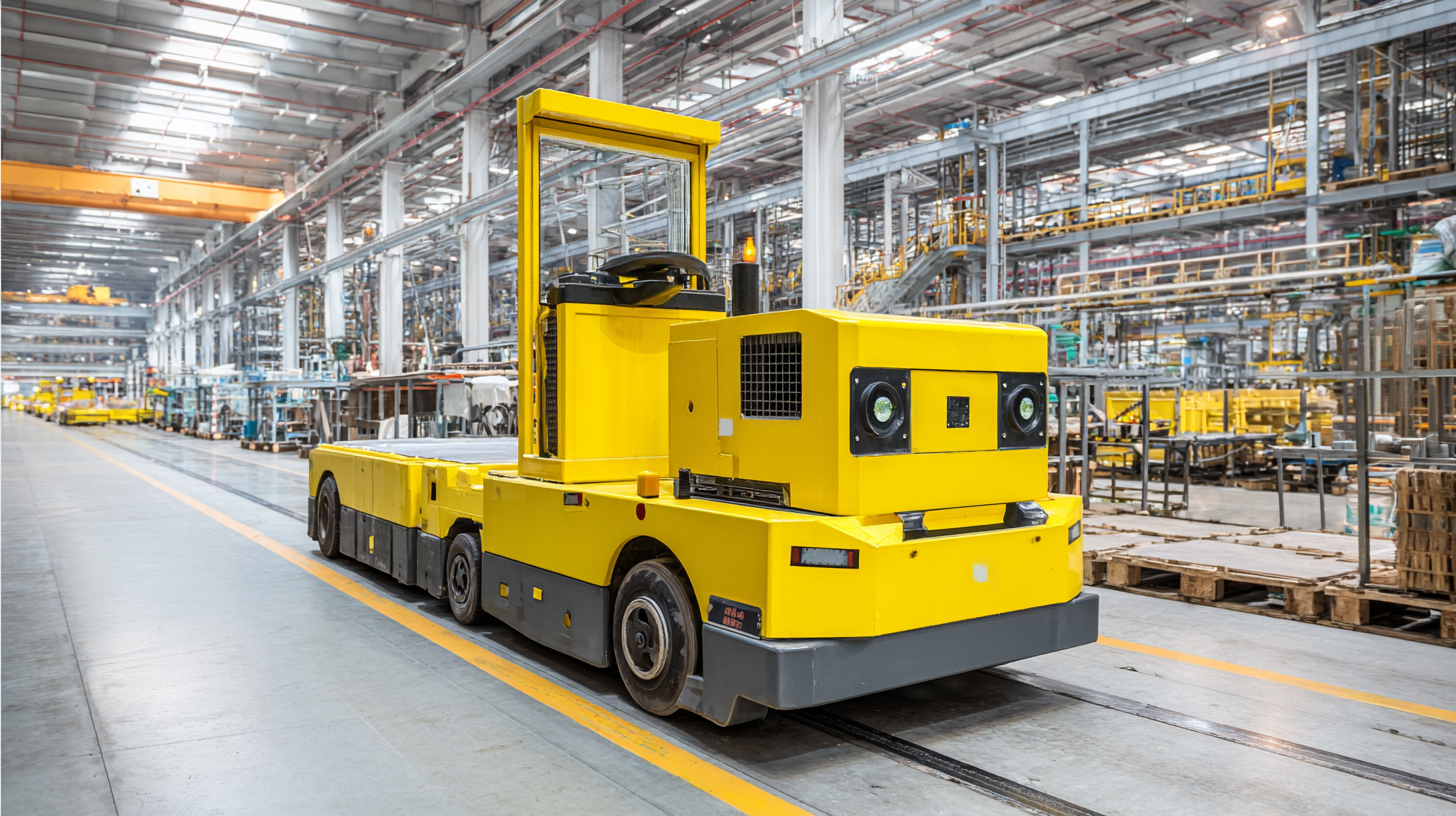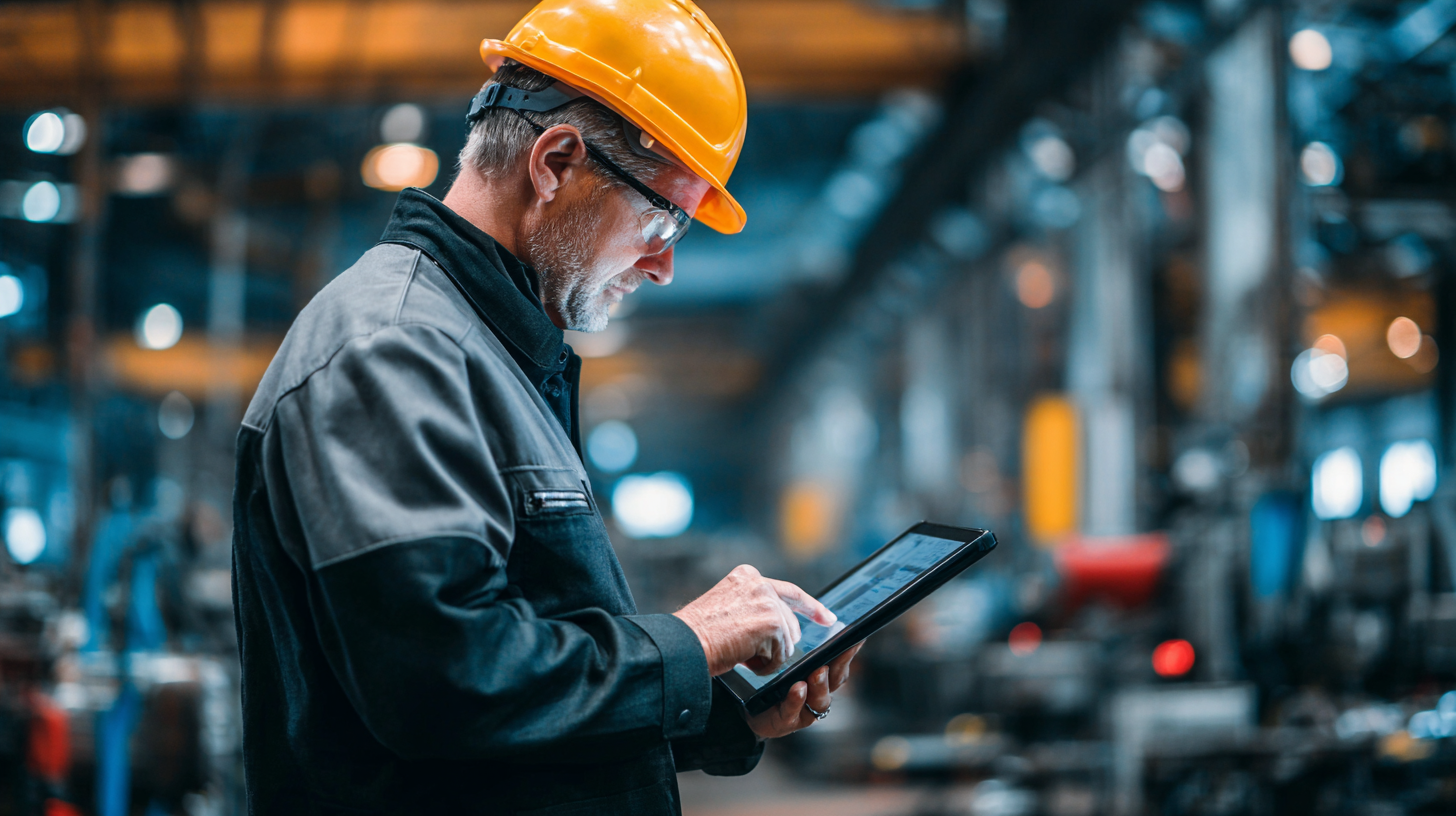Setting New Industry Standards with the Best Tablet Industrial Android Solutions
As the demand for efficient and versatile solutions in various industrial sectors grows, the adoption of Tablet Industrial Android technology has emerged as a game-changer. According to a recent report by Research and Markets, the global rugged tablet market is expected to reach USD 2.78 billion by 2025, driven by the increasing need for mobile computing in demanding environments. This transformative technology offers enhanced durability, seamless connectivity, and user-friendly interfaces, making it ideal for applications in manufacturing, logistics, and healthcare.
Companies leveraging Tablet Industrial Android solutions are not only improving operational efficiencies but also setting new industry standards for productivity and innovation. By integrating these advanced solutions, businesses are well-positioned to navigate the challenges of a rapidly evolving industrial landscape.
Emerging Technologies Transforming Tablet Industrial Android Solutions
The advent of emerging technologies is dramatically reshaping the landscape of tablet industrial Android solutions. With advancements in artificial intelligence, machine learning, and augmented reality, industries are finding innovative ways to enhance productivity and operational efficiency. These technologies empower tablets to integrate seamlessly into various workflows, allowing for real-time data analytics and improved decision-making processes on the factory floor.
Furthermore, the introduction of IoT (Internet of Things) capabilities is revolutionizing how tablets are utilized in industrial settings. By connecting devices and sensors, tablets can collect and analyze data from machinery and equipment, offering insights that were previously difficult to obtain. This connectivity not only streamlines operations but also contributes to predictive maintenance, reducing downtime and minimizing costs. As these technologies continue to evolve, the potential for tablet industrial Android solutions to set new industry standards becomes increasingly significant.
Setting New Industry Standards with the Best Tablet Industrial Android Solutions
| Dimension |
Value |
| Operating System |
Android 11.0 |
| Processor |
Octa-core Cortex-A73/A53 |
| RAM |
4 GB / 8 GB |
| Storage Options |
64 GB / 128 GB |
| Battery Life |
Up to 15 hours |
| Display Size |
10.1 inches |
| Camera Resolution |
12 MP (Rear), 5 MP (Front) |
| Connectivity |
Wi-Fi, Bluetooth, 4G LTE |
| Weight |
500g |
| Durability Rating |
IP65 |
Key Features of Cutting-Edge Industrial Android Tablets
In the evolving landscape of industrial technology, cutting-edge Android tablets are redefining operational efficiency and user experience. These devices come equipped with features tailored to meet the rigorous demands of various industries. According to recent market research, the demand for robust industrial tablets is projected to grow at a compound annual growth rate (CAGR) of 7.5% over the next five years, driven by the need for enhanced mobile solutions in sectors like logistics, manufacturing, and healthcare.
Key features of these advanced tablets include rugged design for durability, long battery life, and superior processing power to handle complex applications. Enhanced security protocols also ensure that sensitive data is protected, making these devices ideal for frontline workers who require dependability in challenging environments. The integration of AI capabilities further enables more intelligent workflows and real-time data analysis.
Tip: When selecting an industrial Android tablet, prioritize durability ratings and battery life to ensure the device can withstand the demands of your work environment. Additionally, invest in accessories like protective cases and screen shields to maximize the tablet's longevity.

Implementing Industry 2025 Trends for Enhanced Productivity
In the fast-evolving landscape of Industry 4.0, organizations are increasingly looking towards
Industry 2025 trends to leverage enhanced productivity and operational efficiency.
The integration of advanced technologies such as artificial intelligence,
IoT, and big data analytics is reshaping the way businesses approach their workflows.
As companies adopt these technologies,
industrial Android tablets emerge as a pivotal tool, offering a perfect blend of portability and powerful computing capabilities.
Their ability to streamline processes and provide real-time data access empowers staff on the ground, enabling quicker decision-making and improved workflow.
Moreover, the implementation of Industry 2025 trends is not just about adopting new technologies, but also about fostering
a culture of innovation and agility.
Organizations need to equip their workforces with the right tools to adapt to changing demands swiftly.
Industrial Android solutions, with their robust features and adaptability, are designed to support this transformative journey.
By facilitating seamless communication and data sharing, these tablets play a crucial role in enhancing productivity, making the workplace more efficient and responsive to market needs.
Embracing these solutions is essential for companies aiming to stay ahead in a competitive environment.
Best Practices for Choosing the Right Tablet Solutions for Your Business
When choosing the right tablet solutions for your business, it’s essential to consider several best practices that can lead to enhanced efficiency and productivity. According to a recent report by MarketsandMarkets, the global industrial tablet market is projected to grow from $1.20 billion in 2020 to $2.43 billion by 2025, highlighting the rising demand for robust and versatile tablet solutions tailored for industrial environments. Businesses must prioritize tablets that offer durability, functionality, and compatibility with existing systems to ensure seamless integration into their operations.
One critical aspect is assessing the operating system's resilience and support for enterprise applications. Industrial Android tablets, for instance, provide flexibility and accessibility while maintaining strong security features. A survey conducted by Zebra Technologies revealed that 78% of enterprises experienced an increase in productivity after implementing mobile solutions in their operations. Therefore, selecting devices that not only meet operational demands but also possess the capability for regular software updates and technical support can significantly impact overall business performance.

Future Prospects: How Tablet Technology Will Shape Industry Standards
As industries continue to evolve, tablet technology is set to play a pivotal role in shaping future standards across various sectors. The infusion of advanced features such as Artificial Intelligence and IoT into tablet solutions enables organizations to adapt swiftly to changing demands. The agility that these devices offer is crucial for industries, especially in logistics and manufacturing, where real-time data access leads to improved decision-making and operational efficiency.
Looking ahead, the integration of tablet devices with AI capabilities will not only enhance productivity but also redefine workforce dynamics. As we approach 2025, companies are recognizing the importance of equipping their employees with tools that facilitate seamless collaboration and communication. Tablets serve as a bridge, connecting on-site and remote workers, thereby supporting the flexible work environments that will define the future. The emphasis on user-friendly interfaces and robust performance reaffirms that tablet technology will not only support but also elevate the standards of operational excellence across industries.

Home
Products
Solutions
MDM Software
OEM/ODM
About Us
About 3Rtablet
Quality Control
Contact Us
News
New Product Launch: 3R Rugged Tablet PC: AT-10AL—Powerful Customization with Yocto System
3Rtablet: Enhancing Your Off-Road Adventures,Your Ultimate Off-Road Companion
3Rtablet: Powering Productivity in Construction and Agriculture
Choosing Your Ideal Linux Rugged Tablet: Why Opt for Yocto?
Choosing Your Ideal Linux Rugged Tablet: Why Opt for Debian?
Yocto VS Debian - Choosing Between Yocto and Debian
GMS Certified Android Device: Ensuring Compatibility, Security and Rich Functions
New Arrivals: Rugged Android 12.0 or Linux Yocto OS Vehicle Telematics Box for Vehicle Applications in Various Sectors
Rugged Tablet For Taxi Dispatch
Rugged Driver Tablets Revolutionize Safety and Efficiency in Mining Operations
Rugged In-Vehicle Tablets Power the Growth of IoT Revolution in Modern Industries
VT-7A PRO: New Android 13 Rugged Vehicle Tablet with GMS Certification
Taxi Dispatch Rugged Vehicle Tablet: Taximeter Ruggedized Car Tablet PC with CANBUS MDT Terminal Is Bound to Make an Impact in Your Business
Sick and Tired of Doing Fleet Management the Old Way? Read This! Discover Smarter Solutions with MDT Terminals, Rugged Vehicle Tablets, MDM Platforms, and More
Global Memory Supply Faces Severe Disruptions Amid AI-Driven Demand Surge
Public Transportation Transformation Accelerates: Rugged Tablets Become the Brain of the Smart Bus
Smart Anti-Collision System Unveiled: Rugged Tablet Integrates Advanced Al Pedestrian Detection Reversing Camera Technology
Driving Forward Together | Merry Christmas from 3Rtablet
Experience Durability: How 3Rtablet Redefines the Standards of a China Leading 7 Inch Tablet Rugged Factory
A Comprehensive Buyer’s Guide to Selecting a China Leading IP67 Rugged Devices Supplier
FAQs
 AT-10A
AT-10A AT-10AL
AT-10AL VT-7 GA/GE
VT-7 GA/GE VT-7 Pro
VT-7 Pro VT-7 PRO (AHD)
VT-7 PRO (AHD) VT-7A
VT-7A VT-7AL
VT-7AL VT-10
VT-10 VT-10 IMX
VT-10 IMX VT-10 Pro
VT-10 Pro VT-10 Pro AHD
VT-10 Pro AHD VT-7
VT-7 VT-7A PRO
VT-7A PRO VT-10A Pro
VT-10A Pro ST-7 Rugged Table
ST-7 Rugged Table VT-5A
VT-5A VT-5
VT-5 VT-BOX
VT-BOX VT-BOX-II
VT-BOX-II AI-MDVR040
AI-MDVR040 AT-B2
AT-B2 AT-R2
AT-R2

